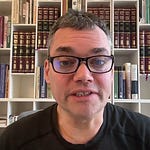Our Zoom call this week will be at our regular time: Noon on Friday.
Our guests will be two Columbia University undergraduates with differing views on the protests at their campus: Ilan Cohen, a senior who attends Columbia and the Jewish Theological Seminary, and Gabi Frants, a senior who attends Barnard College. They’ll talk about the student movement that has swept Columbia, and the nation.
Paid subscribers will get the link this Tuesday night and the video the following week. They’ll also gain access to our library of past Zoom interviews with guests like Rashid Khalidi, Thomas Friedman, Ilhan Omar, Benny Morris, Noam Chomsky, and Bret Stephens.
Sources Cited in this Video
In today’s video, I accidentally said Gaza has been under blockade since 2017. It’s 2007.
Scenes from the campus protests that give me hope.
Things to Read
(Maybe this should be obvious, but I link to articles and videos I find provocative and significant, not necessarily ones I entirely agree with.)
On the Jewish Currents (subscribe!) podcast, Arielle Angel interviews Jewish student organizers at the Columbia Palestine solidarity encampment.
Last week’s guest, Dr. Musallam Abu Khalil, runs a charity that promotes the health and wellness of people in Gaza’s Nusierat Refugee Camp. Please consider supporting it.
What it’s like to be a Jewish Pro-Palestine organizer at Columbia.
Amira Hass on how people in Gaza feel about Hamas.
Ahmad Moor on why he can’t vote for Joe Biden.
For the Foundation for Middle East Peace’s Occupied Thoughts Podcast, I spoke to Seth Binder about what it means to condition US aid to Israel.
I’ll be speaking on May 8 at Whitman College.
See you on Friday at Noon,
Peter
VIDEO TRANSCRIPT:
We’re witnessing something that I’m not sure I ever thought we would witness, which is that the struggle for Palestinian liberation has really captured the minds of kind of a whole generation of young Americans—and very quickly—and is convulsing America’s universities in a way that no foreign policy issue has in at least a generation. And I’m very keenly aware that, for many American Jews, including many American Jewish college students, this provokes tremendous fear. And I don’t want to belittle or minimize that. I have some understanding myself of where this fear comes from. I feel it even myself. We are a people that, I think, in our marrow as Jews, we have the sense that history can turn very quickly. And this is the really the story of many of our holidays, but also of our secular history that things can seem settled, and safe, and Jews can be okay, and even have some degree of influence. And then, quite quickly, things can turn, and we can become the scapegoats, that people can turn on us often in a kind of popular upsurge of something.
And so, seen through that lens, I can understand why this moment can provoke great fear in a lot of people. Because the truth is that the organized American Jewish community has for many decades now wielded a lot of influence over the terms of debate on Israel, been able to circumscribe those debates—circumscribe those debates in ways that I have been criticizing for much of my adult life. But still, for many American Jews, and even myself at certain moments, I must admit creates a sense of security, of safety, that we have a certain influence, even a certain kind of control that things are not getting out of hand, that we understand the terms of these debates. And now something that’s changing, something really radically new is being born in progressive circles, and I think increasingly inside the Democratic party, in which those debates will not be, you know, circumscribed by the American Jewish establishment in the way that they were.
And I also understand that people see in this movement things that frightened them, things that seem hostile and hateful, and indeed are hostile and hateful. But it’s worth remembering that all great social movements, all large social movements, attract different kinds of people and different kinds of voices. And so, you could have seen in the anti-war movement, people carrying North Vietnamese flags, people who were chanting for the victory of the North Vietnamese over American soldiers and a Marxist triumph. You could have seen people in the anti-apartheid movement chanting ‘one settler, one bullet,’ kind of a violent dehumanizing vision of how apartheid South Africa should should end.
There is a tendency in some parts of the media, and certainly online, to amplify and focus on the most hateful, disturbing things that you see from this movement. And I think that those things must be condemned. They must be criticized. And I’m not suggesting, not for a moment, that this movement or any movement should be worshiped, that people should abandon their critical faculties. Not at all. I don’t like this discourse that you sometimes hear on the left that to be an ally of a group means that you have to salute at whatever is done in its name. It’s important to always maintain the right to criticize any group of people, including a movement that speaks in the name of Palestinian freedom.
And so, yes, I don’t like it when I hear people say something like ‘all resistance is legitimate’ in the wake of the horrifying attack of October 7th. That seems to me to blur a critically important distinction between resistance to oppression that follows international law, and that recognizes that it is wrong to take civilian life, and what we saw on October 7th. So yes, criticize that. Criticize slogans like ‘Palestine will be free from the river to the sea,’ which don’t acknowledge a place for Israeli Jews in that vision. Because I don’t think it’s realistic to imagine that there will be a country called Palestine, in which all people will be Palestinians. This is a bi-national country. A country of two collectives, both of whom’s identity need to be recognized in a political system that provides complete equality and indeed historical justice and freedom. So, yes, Jews should feel they have every right, every right to criticize things that they find are disturbing or that dehumanize us.
And yet, for all of that, I think this movement is a tremendous opportunity, a tremendous opportunity. And for the Jewish community to ally itself with the Elise Stephaniks and Mike Johnsons and Donald Trumps, who want to crush this movement because they want to crush America’s universities, because they fear universities as places that produce critical thinking, and as places that can be a challenge to white Christian supremacist authoritarianism, it would be a terrible, terrible mistake to join forces with those people as they try to crush freedom of speech and freedom of expression. This movement holds the possibility in a way that no movement in America has in my entire lifetime to end American institutional complicity with the oppression of the Palestinian people.
It’s important not to get distracted by one particular video you might see and to focus attention on the core demands of this movement. And so, much of the journalism that I see, frankly, frustrates me because it doesn’t actually take seriously the core demands of this movement, and instead wants to focus on one particular slogan, or one particular speech, or one particular video. What’s important about the anti-war movement in Vietnam was that it wanted to end the war. What was important about the anti-apartheid movement in South Africa was that wanted to end American complicity, complicity in South Africa. That was the core of the movement. The core of this movement is the demand to end university and American governmental complicity with Israel’s system of oppression, which is now culminated in this horrifying slaughter of people in Gaza.
This complicity must end. It must end because, among other things, it puts Jews in danger. We must see the lie that you can construct a system of Jewish safety on the destruction and brutalization of another people. We should recognize that October the 7th is just a taste of the horrors that will come to everybody if this system of oppression is deepened and entrenched. Because a system of violence breeds violence. That does not excuse Hamas from its moral responsibility for the horrors of October 7th, not for a second. That’s why I said it’s critical that we promote the idea, that we argue for a movement that makes the distinction between ethical and unethical resistance.
But the truth is that systems of violence ultimately endanger everybody. And this system of group oppression, a system that has held millions of Palestinians in the West Bank without the most basic of human rights for more than a half century, without the right to vote, without the right to be a citizen of the country in which you live, without free movement, which has held Palestinians since 2017 under a suffocating blockade that Human Rights Watch calls an open air prison, and the UN says is unlivable. And organized American Jewish organizations want to pretend that those things are untrue. But if the UN or Human Rights Watch said them about any other place in the world, they would recognize they are true. It’s only because we don’t want to face these things, and we want to believe that our safety can be bought at the expense of Palestinians. And that is a lie in the long term. This system endangers everybody between the river and the sea, and perhaps all of us whose fates are bound up with what happens there.
And that’s why the core demands of this movement seem to me to be just and create the possibility for a future in which Israeli Jews are truly safe because the only way they can be truly safe is if Palestinians are truly safe. And the only way that Palestinians can be truly safe is if Palestinians are free. And so, I would really urge people who find this movement frightening to not only look at those frightening videos, but to watch the videos that we saw from Columbia of students at that encampment: Muslims praying, and Jews praying; of Jews holding Kabbalat Shabbat and Passover Seders, being protected alongside people of every different background and race and religion. And see this as a vision of hope, the vision of hope that we desperately, desperately need.
Because this is what cannot exist right now in Israel-Palestine: true equality between Jews and Palestinians and of people of all different backgrounds living in equality, and supporting each other, and taking care of one another, and honoring one another. It can’t exist because of the system of oppression. And so, when we see this movement and what’s happening, it offers, it seems to me, the kernel of us being able to imagine a different future: a future of mutual respect, and mutual equality, and mutual safety, and mutual liberation. And we desperately, perhaps above all else in this moment of harm, we need that sense of hope.
So, that’s why I think this movement should not be worshiped. It should be criticized when it deserves criticism. Jews have the right to speak up for ourselves if we see anything that we genuinely believe is hateful towards Jews per se. But we should also recognize that, like nothing we have seen before in my lifetime, that this movement holds the possibility for ending Israeli impunity, and potentially, therefore—potentially—creating a different kind of conversation in Israel about what keeps Jews safe. The recognition that white South Africans came to finally: that only equality truly keeps people safe. And that that could be, from this movement, could come not just Palestinian liberation, but Jewish liberation as well.


















